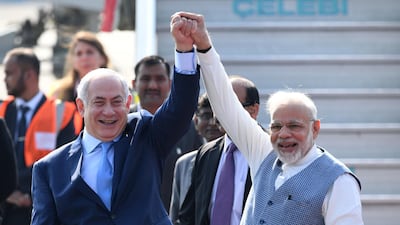Had all gone to plan, Benjamin Netanyahu and Narendra Modi might have met in India this week and furthered a bizarre narrative. It is one that tells of a so-called bromance that mirrors the increasingly urgent relationship between their countries.
In the past two years, the Israeli and Indian prime ministers have found striking new ways to declare their “deepest friendship”.
Two years ago, it took the form of the two leaders companionably dipping their toes in the Mediterranean, off a beach in Israel. Last year, it involved Mr Modi providing instruction to Mr Netanyahu on how to fly a kite in the Indian skies.
Had Mr Netanyahu's India trip this month materialised, the two men would surely have exchanged fulsome greetings on Twitter in Hindi and in Hebrew, just as they have done before, using warm words and gestures to underline an indispensable, long-standing relationship.
But is this even true? India and Israel have maintained a distance for the greater part of their existence as independent nations. They have only had formal diplomatic relations for 27 years. The relationship first failed to take off when newly independent India voting against the November 1947 United Nations Palestine partition plan, which established the Jewish state.
When India officially recognised Israel in 1950, it was done begrudgingly. India’s first prime minister Jawaharlal Nehru acknowledged that recognition was granted only because “Israel is a fact”.
Decades of Indian reserve towards Israel followed. Although it’s often described as principled support for the post-colonial Arab world and the Palestinians, that is only part of the story.
As Nehru said in his response to Albert Einstein’s appeal for India to support the Zionist cause, national leaders have to “unfortunately” pursue policies that are “essentially selfish…each country thinks of its own interest first”.
At the time, India’s self-interest lay in maintaining harmony at home, not least by taking into account the sentiments of its large Muslim minority. As a fledgling nation, India was keen not to antagonise other countries and to maintain ties with Arab allies. Things began to change in the 1980s, when the Indian and Israeli militaries started to build a relationship.
After the end of the Cold War, India established formal ties with Israel in recognition of the changing world order. A transactional relationship was forged, with India accounting for 49 per cent of Israeli arms exports between 2013 and 2017, according to the Stockholm International Peace Research Institute.
Of course, nothing in that potted history of Indian-Israeli relations explains Mr Modi and Mr Netanyahu’s very public affinity, complete with bear hugs and repeated declarations of personal regard.
In 2017, Mr Modi became the first Indian prime minister ever to visit Israel, a political sore point that Mr Netanyahu subtly turned into a personal compliment to his guest. “We have waited 70 years for you,” he told Mr Modi in Tel Aviv.
In January last year, Mr Netanyahu made the first visit by an Israeli prime minister to India in 15 years.
And then came news of Mr Netanyahu’s plan to squeeze in yet another quick visit to India before Israel’s April 9 elections.
It might still happen, although both leaders are preparing to fight for their political careers at the polls.
So what draws the two men so close together, even though their countries disagree on the approach to Iran and the decision by Donald Trump to move the US embassy to Jerusalem?
Both men are linked in a unique fashion. Born a year apart – Mr Netanyahu in 1949 and Mr Modi in 1950 – they are the first prime ministers of their respective countries to have been born after independence.
And then we come to their politics. Both are hardliners. Mani Shankar Aiyar, a former Indian diplomat and a member of India’s main opposition Congress Party, once described the two men as “made for each other”.
Both have “a narrow, sectarian nationalism”, Mr Aiyar said, “whose driving force is the demonisation of ‘the other’ – Pakistan in the case of Modi and Palestine in Netanyahu’s case”.
Indeed, India’s Hindutva forces and Israel’s right wing often make common cause against Muslims and Mr Modi and Mr Netanyahu have gone to some lengths to underline their peoples’ shared experience of terrorism and admirable resilience in the face of an existential threat.
Finally, they both face the electorate's verdict at about the same time and need to appear powerful and popular on the world stage.
Victory is not assured for either man. Mr Netanyahu is beleaguered by corruption allegations and Mr Modi by public discontent over the economy.
But there is one last thing that unites them: sheer, naked ambition.


